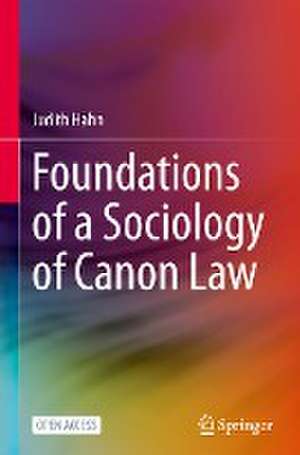Foundations of a Sociology of Canon Law
Autor Judith Hahnen Limba Engleză Hardback – 8 aug 2022
This book is of interest to researchers and students of the sociology of law, legal studies, law and religion, the sociology of religion, theology, and religious studies.
This is an open access book.
Preț: 426.18 lei
Nou
Puncte Express: 639
Preț estimativ în valută:
81.55€ • 87.20$ • 67.99£
81.55€ • 87.20$ • 67.99£
Carte tipărită la comandă
Livrare economică 18 aprilie-02 mai
Preluare comenzi: 021 569.72.76
Specificații
ISBN-13: 9783031017902
ISBN-10: 3031017900
Pagini: 235
Ilustrații: XIV, 235 p.
Dimensiuni: 155 x 235 mm
Greutate: 0.53 kg
Ediția:1st ed. 2022
Editura: Springer International Publishing
Colecția Springer
Locul publicării:Cham, Switzerland
ISBN-10: 3031017900
Pagini: 235
Ilustrații: XIV, 235 p.
Dimensiuni: 155 x 235 mm
Greutate: 0.53 kg
Ediția:1st ed. 2022
Editura: Springer International Publishing
Colecția Springer
Locul publicării:Cham, Switzerland
Cuprins
Preface
1 Introduction: Why Write a Sociology of Canon Law?
1.1 Canon Law Studies—A Theological Discipline
1.2 Employing Juridical Methodology
1.3 Employing Sociological Methodology
1.4 How to Approach a Sociology of Canon Law
2 The Sociological View of the Law2.1The Law through a Sociological Lens
2.2 A Sociological Focus on Canon Law
3 The Functions of the Law
3.1 Law and the Order of the Social
3.2 Law and the Resolution of Conflicts
4 The Validity of Positive Law
4.1 Modern Law as Positive Law
4.2 Law Derived from Power, Power Derived from the Law
4.3 Characteristics of Positive Law
5 The Validity of the Law and the Issue of Legitimacy
5.1 A Sociological View on Validity Issues
5.2 Accepting Canon Law?
6 The Effectiveness of the Law
6.1 Effectiveness and Compliance
6.2 Preconditions of Compliance
6.3 The Connection of the Effectiveness and Validity of the Law
7 Résumé
7.1 An Outlook for Further Studies
7.2 Summary of the Book (in Theses)
Bibliography
Name and Subject Index
Notă biografică
Judith Hahn is a theologian and canon lawyer (Dipl theol, 2002, Frankfurt am Main; JCL, 2004, Dr theol, 2008, Habilitation, 2016, University of Münster). She is currently serving as University Professor of Canon Law at the Faculty of Catholic Theology, University of Bonn. Judith was a Visiting Scholar at Thomas More Law School, Australian Catholic University in 2019–20 and at the Faculty of Theology and Religion, University of Oxford, in 2016, and a Fellow at the Käte Hamburger Center for Advanced Study “Law as Culture”, University of Bonn, 2015–16. She is also a pro bono judge at the Ecclesiastical Labour Court, Bonn. Judith has published extensively on the theory and sociology of canon law and on the status of religious law in secular law, the liberal state, and modern society, including the books Grundlegung der Kirchenrechtssoziologie (Springer 2019), and Church Law in Modernity (Cambridge University Press, 2019).
Textul de pe ultima copertă
This "Open Access" book investigates the legal reality of the church through a sociological lens and from the perspective of canon law studies, the discipline which researches the law and the legal structure of the Catholic Church. It introduces readers from various backgrounds to the sociology of canon law, which is both a legal and a theological field of study, and is the first step towards introducing a new subdiscipline of the sociology of canon law. As a theoretical approach to mapping out this field, it asks what theology and canon law may learn from sociology; it discusses the understanding of “law” in religious contexts; studies the preconditions of legal validity and effectiveness; and based on these findings it asks in what sense it is possible to speak of canon “law”. By studying a religious order as its struggles to find a balance between continuity and change, this book also contributes to the debates on religious law in modernity and the challenges it faces from secular states and plural societies.
This book is of interest to researchers and students of the sociology of law, legal studies, law and religion, the sociology of religion, theology, and religious studies.
This book is of interest to researchers and students of the sociology of law, legal studies, law and religion, the sociology of religion, theology, and religious studies.
Caracteristici
Discusses a possible sociology of canon law from the internal perspective of canon law studies
Studies the delicate connection between religion and law
Analyses the way in which canon law impacts the present critical status of the Roman Catholic Church
This book is open access, which means that you have free and unlimited access
Studies the delicate connection between religion and law
Analyses the way in which canon law impacts the present critical status of the Roman Catholic Church
This book is open access, which means that you have free and unlimited access
